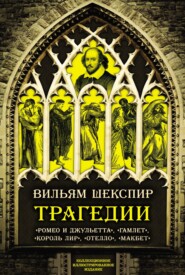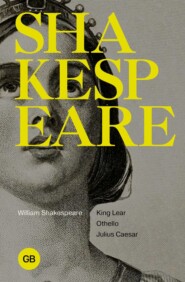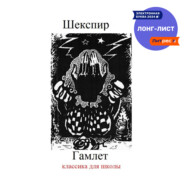По всем вопросам обращайтесь на: info@litportal.ru
(©) 2003-2024.
✖
The Life of King Henry the Fifth
Настройки чтения
Размер шрифта
Высота строк
Поля
My Lord of Cambridge, and my kind Lord of Masham,
And you, my gentle knight, give me your thoughts.
Think you not that the pow'rs we bear with us
Will cut their passage through the force of France,
Doing the execution and the act
For which we have in head assembled them?
SCROOP. No doubt, my liege, if each man do his best.
KING HENRY. I doubt not that, since we are well persuaded
We carry not a heart with us from hence
That grows not in a fair consent with ours;
Nor leave not one behind that doth not wish
Success and conquest to attend on us.
CAMBRIDGE. Never was monarch better fear'd and lov'd
Than is your Majesty. There's not, I think, a subject
That sits in heart-grief and uneasines
Under the sweet shade of your government.
GREY. True: those that were your father's enemies
Have steep'd their galls in honey, and do serve you
With hearts create of duty and of zeal.
KING HENRY. We therefore have great cause of thankfulness,
And shall forget the office of our hand
Sooner than quittance of desert and merit
According to the weight and worthiness.
SCROOP. So service shall with steeled sinews toil,
And labour shall refresh itself with hope,
To do your Grace incessant services.
KING HENRY. We judge no less. Uncle of Exeter,
Enlarge the man committed yesterday
That rail'd against our person. We consider
It was excess of wine that set him on;
And on his more advice we pardon him.
SCROOP. That's mercy, but too much security.
Let him be punish'd, sovereign, lest example
Breed, by his sufferance, more of such a kind.
KING HENRY. O, let us yet be merciful!
CAMBRIDGE. So may your Highness, and yet punish too.
GREY. Sir,
You show great mercy if you give him life,
After the taste of much correction.
KING HENRY. Alas, your too much love and care of me
Are heavy orisons 'gainst this poor wretch!
If little faults proceeding on distemper
Shall not be wink'd at, how shall we stretch our eye
When capital crimes, chew'd, swallow'd, and digested,
Appear before us? We'll yet enlarge that man,
Though Cambridge, Scroop, and Grey, in their dear care
And tender preservation of our person,
Would have him punish'd. And now to our French causes:
Who are the late commissioners?
CAMBRIDGE. I one, my lord.
Your Highness bade me ask for it to-day.
SCROOP. So did you me, my liege.
GREY. And I, my royal sovereign.
KING HENRY. Then, Richard Earl of Cambridge, there is yours;
There yours, Lord Scroop of Masham; and, Sir Knight,
Grey of Northumberland, this same is yours.
Read them, and know I know your worthiness.
My Lord of Westmoreland, and uncle Exeter,
We will aboard to-night. Why, how now, gentlemen?
What see you in those papers, that you lose
So much complexion? Look ye how they change!
Their cheeks are paper. Why, what read you there
That have so cowarded and chas'd your blood
Out of appearance?
CAMBRIDGE. I do confess my fault,
And do submit me to your Highness' mercy.
GREY, SCROOP. To which we all appeal.
KING HENRY. The mercy that was quick in us but late
By your own counsel is suppress'd and kill'd.
You must not dare, for shame, to talk of mercy;
For your own reasons turn into your bosoms
As dogs upon their masters, worrying you.
See you, my princes and my noble peers,
These English monsters! My Lord of Cambridge here-
You know how apt our love was to accord
To furnish him with an appertinents
Belonging to his honour; and this man
Hath, for a few light crowns, lightly conspir'd,
And sworn unto the practices of France
To kill us here in Hampton; to the which
This knight, no less for bounty bound to us
Than Cambridge is, hath likewise sworn. But, O,
What shall I say to thee, Lord Scroop, thou cruel,
Ingrateful, savage, and inhuman creature?
Thou that didst bear the key of all my counsels,
That knew'st the very bottom of my soul,
That almost mightst have coin'd me into gold,
Wouldst thou have practis'd on me for thy use-
May it be possible that foreign hire
Could out of thee extract one spark of evil
That might annoy my finger? 'Tis so strange
That, though the truth of it stands off as gross
As black and white, my eye will scarcely see it.
Treason and murder ever kept together,
As two yoke-devils sworn to either's purpose,
Working so grossly in a natural cause
That admiration did not whoop at them;
But thou, 'gainst all proportion, didst bring in
Wonder to wait on treason and on murder;
And whatsoever cunning fiend it was
And you, my gentle knight, give me your thoughts.
Think you not that the pow'rs we bear with us
Will cut their passage through the force of France,
Doing the execution and the act
For which we have in head assembled them?
SCROOP. No doubt, my liege, if each man do his best.
KING HENRY. I doubt not that, since we are well persuaded
We carry not a heart with us from hence
That grows not in a fair consent with ours;
Nor leave not one behind that doth not wish
Success and conquest to attend on us.
CAMBRIDGE. Never was monarch better fear'd and lov'd
Than is your Majesty. There's not, I think, a subject
That sits in heart-grief and uneasines
Under the sweet shade of your government.
GREY. True: those that were your father's enemies
Have steep'd their galls in honey, and do serve you
With hearts create of duty and of zeal.
KING HENRY. We therefore have great cause of thankfulness,
And shall forget the office of our hand
Sooner than quittance of desert and merit
According to the weight and worthiness.
SCROOP. So service shall with steeled sinews toil,
And labour shall refresh itself with hope,
To do your Grace incessant services.
KING HENRY. We judge no less. Uncle of Exeter,
Enlarge the man committed yesterday
That rail'd against our person. We consider
It was excess of wine that set him on;
And on his more advice we pardon him.
SCROOP. That's mercy, but too much security.
Let him be punish'd, sovereign, lest example
Breed, by his sufferance, more of such a kind.
KING HENRY. O, let us yet be merciful!
CAMBRIDGE. So may your Highness, and yet punish too.
GREY. Sir,
You show great mercy if you give him life,
After the taste of much correction.
KING HENRY. Alas, your too much love and care of me
Are heavy orisons 'gainst this poor wretch!
If little faults proceeding on distemper
Shall not be wink'd at, how shall we stretch our eye
When capital crimes, chew'd, swallow'd, and digested,
Appear before us? We'll yet enlarge that man,
Though Cambridge, Scroop, and Grey, in their dear care
And tender preservation of our person,
Would have him punish'd. And now to our French causes:
Who are the late commissioners?
CAMBRIDGE. I one, my lord.
Your Highness bade me ask for it to-day.
SCROOP. So did you me, my liege.
GREY. And I, my royal sovereign.
KING HENRY. Then, Richard Earl of Cambridge, there is yours;
There yours, Lord Scroop of Masham; and, Sir Knight,
Grey of Northumberland, this same is yours.
Read them, and know I know your worthiness.
My Lord of Westmoreland, and uncle Exeter,
We will aboard to-night. Why, how now, gentlemen?
What see you in those papers, that you lose
So much complexion? Look ye how they change!
Their cheeks are paper. Why, what read you there
That have so cowarded and chas'd your blood
Out of appearance?
CAMBRIDGE. I do confess my fault,
And do submit me to your Highness' mercy.
GREY, SCROOP. To which we all appeal.
KING HENRY. The mercy that was quick in us but late
By your own counsel is suppress'd and kill'd.
You must not dare, for shame, to talk of mercy;
For your own reasons turn into your bosoms
As dogs upon their masters, worrying you.
See you, my princes and my noble peers,
These English monsters! My Lord of Cambridge here-
You know how apt our love was to accord
To furnish him with an appertinents
Belonging to his honour; and this man
Hath, for a few light crowns, lightly conspir'd,
And sworn unto the practices of France
To kill us here in Hampton; to the which
This knight, no less for bounty bound to us
Than Cambridge is, hath likewise sworn. But, O,
What shall I say to thee, Lord Scroop, thou cruel,
Ingrateful, savage, and inhuman creature?
Thou that didst bear the key of all my counsels,
That knew'st the very bottom of my soul,
That almost mightst have coin'd me into gold,
Wouldst thou have practis'd on me for thy use-
May it be possible that foreign hire
Could out of thee extract one spark of evil
That might annoy my finger? 'Tis so strange
That, though the truth of it stands off as gross
As black and white, my eye will scarcely see it.
Treason and murder ever kept together,
As two yoke-devils sworn to either's purpose,
Working so grossly in a natural cause
That admiration did not whoop at them;
But thou, 'gainst all proportion, didst bring in
Wonder to wait on treason and on murder;
And whatsoever cunning fiend it was

















